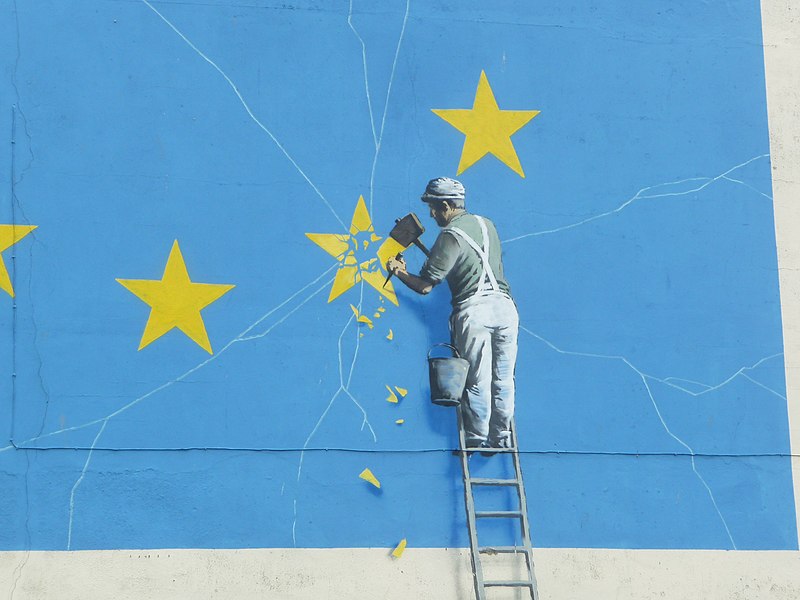
Using the public’s fear about certain topics is a popular strategy often used by politicians to win over people’s support. Whether these topics are supported by facts is not important in politics of fear. It is about planting a seed, giving it water and making it grow into a beautiful flower called victory.
Using the public’s fear about certain topics is a popular strategy often used by politicians to win over people’s support. Whether these topics are supported by facts is not important in politics of fear. It is about planting a seed, giving it water and making it grow into a beautiful flower called victory.

If you follow politics at all, then I bet you are no stranger to campaigns using slogans to provoke and spread fear among the population. One recent example is the Brexit campaign. The remain campaign became known as ‘Project Fear’ because of the amount of danger claims they used to convince the public of their statement. However, the leave campaign also used a lot of danger claims. The UK is far from the only country using fear as their strategy. Let’s take a look at the US, and Donald Trump’s 2016 campaign in particular, who is no stranger to the use of fear in politics either. The public’s fear of Muslims and immigrants played a big part in him convincing and motivating people to vote for him. Last but not least, there is the Dutch Partij voor de Vrijheid (PVV) whose very first sentence in their campaign program is how they are sick and tired of the Islam, mass immigration and violence (Partij voor de Vrijheid, 2017).
These politicians spread frightening exaggerated rumours and ideas about issues that might possibly form a threat. What they basically do is called fear-mongering. It is a tactic of purposely arousing public fear about an issue that is usually based on very little fact. The sad thing is: it works. The PVV uses, as mentioned above, the public’s fear of violence in their campaign. But what they do not mention, is that the crime rate in the Netherlands has decreased over the last fifteen years (CBS) and according to the World Economic Forum global competitiveness report, the Netherlands is ranked seventeenth on the list of safest countries in the world (The Global Competitiveness Report 2018). But apparently spreading fear about violence and immigrants in a relatively safe country works. During the elections in 2017, the PVV ended up being the second largest party in the Netherlands (Kiesraad, 2017) and according to the latest polls, it still is (NOS, 2018).
So how do these politicians do it? It is a tactic that the British call ‘Politicians logic’, derived from a BBC sitcom called Yes, Prime Minister (1988). It is a logical fallacy which takes the following form: To improve things, things must change. We change things, so we improve things. For example, according to president Trump and many others who voted for him, the border between Mexico and the US is a big problem because people are able to enter the US illegally. The plan that he shared with the world during his campaign, and is currently trying to execute, is to build a wall between the two countries to prevent illegal immigrants from entering the US (BCC, 2019). The result is that more than 7000 Central American migrants, sometimes also called the migrant caravan, who, after traveling about 4000 kilometres, are now stuck at the US border (BBC, 2018). Politicians are addressing the problem, so the problem is fixed, right? Well, not so much. When immigrants from Mexico or elsewhere enter the border they are entitled to apply for asylum. They are allowed to live in the US and wait for their asylum hearing. Those who are illegally in the US most likely overstayed their temporary visas, which is a problem Trump’s big beautiful wall won’t fix (Gawthorpe, 2019). And yet, there are people who like a wall between the two borders enough to donate money. Over a hundred thousand people have donated money to fund the wall, all fuelled by the fear of who might cross that border (Brantley, Griffith & Simpson, 2018). It’s no surprise that so many American citizens are afraid of illegal immigrants and what they might do, when their own president says that ‘these aren’t people, these are animals’ (Gomez & Korte, 2018). He also states that ‘if you don’t want America to be overrun by masses of illegal aliens and giant caravans, you’d better vote Republican’ (BBC, 2018).
“It is a tactic of arousing public fear about an issue that is based on very little fact”
Let’s go back to the Brexit and ‘Project Fear’. The remain campaign of David Cameron, former prime minister of the UK, was based on the fear of higher cost for almost everything. The Brexit campaign was based on the fear of losing control to the EU (Mason, Steward & Syal, 2016). But what, according to Alan Travis, who is home affairs editor at The Guardian, really drove the public to vote for the Brexit was the amount of immigrants that entered the UK in 2015, which almost hit a record. These numbers where used to convince the public that this mass migration was out of control (Travis, 2016). As Boris Johnson, former London Mayer and Brexit campaigner stated: ‘If you vote in on June 23 [in the EU referendum], you are kissing goodbye permanently to control of immigration’ (Travis, 2016). Two years after the EU referendum, both the remain and leave campaign are still projecting fearful messages about what will happen if the other side gets their way.
Maybe what some politicians play at, is xenophobia. Xenophobia is a dislike or prejudice against people from other countries (Oxford dictionaries). When politicians say that immigration is out of control and that illegal immigrants are animals, they awaken the already existing xenophobia in people. As Golec de Zavala, social psychologist at the University of London said about xenophobia, in the Brexit campagin: ‘I think the leave campaign gave a new, acceptable way to express xenophobia’ (Travis, 2016). It is a shame that in a world that is constantly striving for equality, it is the fear of others that eventually wins. <<
References
– [Image] Retrieved February 19, 2019 from https://upload.wikimedia.org/wikipedia/commons/thumb/6/69/Brexit_Mural_ %28Banksy%29_03.jpg/800px-Brexit_Mural_%28Banksy%29_03.jpg/.
– BBC. (2018, 26 November). Migrant caravan: what is it and why does it matter? Retrieved February 19, 2019 from https://www.bbc.com/news/world-latin-america-45951782/.
– BBC. (2019, 10 Januari). Why does Donald Trump want to build a wall? Retrieved February 19, 2019 from https://www.bbc.co.uk/newsround/46811167/.
– Brantley, K., Griffith, K., & Simpson, L. (2018, 20 December). GoFundMe campaign to fund Trump’s wall soars to more than 7 million in just four days after triple-amputee veteran ramps up campaign for 1 billion. Retrieved February 19, 2019 from https://www.dailymail.co.uk/news/article-6515009/Crowdfunding-campaign-build-Trumps-border-wall-hits-2-2MILLION-donations.html/.
– Centraal bureau voor de statistiek. (2016, 1 Maart). Nederland steeds minder onveilig. Retrieved February 19, 2019 https://www.cbs.nl/nl-nl/nieuws/2016/09/nederland-steeds-minder-onveilig /.
– Gawthorpe, A. (2019, 15 Januari). Why Trumps ‘big, beautiful’ border wall will never work. Retreived February 19, 2019 from https://www.theguardian.com/commentisfree/2019/jan/15/trump-mexio-border-wall-dangerous-illusion/.
– Gomez, A., & Korte, G. (2018, 17 Mei). Trump ramps up rhetoric on undocumented immigrants: ‘these aren’t people, these are animals’. Retrieved February 19, 2019 from https://eu.usatoday.com/story/news/politics/2018/05/16/trump-immigrants-animals-mexico-democrats-sanctuary-cities/617252002/.
– Kiesraad. (2017, 21 Maart). Officiële uitslag tweede kamer verkiezing 15 Maart 2017. Retrieved February 19, 2019 from https://www.kiesraad.nl/actueel/nieuws/2017/03/20/officiele-uitslag-tweede-kamerverkiezing-15-maart-2017/.
– Mason, R., Stewart, H., & Syal, R. (2016, 22 Juni). David Cameron makes final plea for Brittain to vote to remain in the EU. Retrieved February 19, 2019 from https://www.theguardian.com/politics/2016/jun/22/david-cameron-makes-final-plea-for-britain-to-vote-to-remain-in-the-eu/.
– NOS, (2018, 12 September). Peilingwijzer: PVV krabbelt weer wat op, maar blijft ver achter de VVD. Retrieved February 19, 2019 from https://nos.nl/artikel/2250004-peilingwijzer-pvv-krabbelt-weer-wat-op-maar-blijft-ver-achter-de-vvd.html/.
– Oxford dictionaries. (z.d). Xenophobia. Retrieved February 19, 2019 from https://en.oxforddictionaries.com/definition/xenophobia/.
– Partij Voor de Vrijheid. (2017). Concept – verkiezingsprogramma PVV 2017-2021. Retrieved February 19, 2019 from https://www.pvv.nl/visie.html
– Travis, A. (2016, 26 Mei). Net immigration to UK nears peak as fewer Britons emigrate. Retrieved February 19, 2019 from https://www.theguardian.com/uk-news/2016/may/26/net-migration-to-uk-nears-peak-fewer-britons-emigrate/.
– Travis, A. (2016, 24 Juni). Fear of immigration drove the leave victory-not immigration itself. Retrieved February 19, 2019 from https://www.theguardian.com/politics/2016/jun/24/voting-details-show-immigration-fears-were-paradoxical-but-decisive/.
– World Economic Forum. (2018). The Global Competitiveness report. Retrieved February 19, 2019 from http://www3.weforum.org/docs/GCR2018/05FullReport/TheGlobalCompetitiveness Report2018.pdf/.
If you follow politics at all, then I bet you are no stranger to campaigns using slogans to provoke and spread fear among the population. One recent example is the Brexit campaign. The remain campaign became known as ‘Project Fear’ because of the amount of danger claims they used to convince the public of their statement. However, the leave campaign also used a lot of danger claims. The UK is far from the only country using fear as their strategy. Let’s take a look at the US, and Donald Trump’s 2016 campaign in particular, who is no stranger to the use of fear in politics either. The public’s fear of Muslims and immigrants played a big part in him convincing and motivating people to vote for him. Last but not least, there is the Dutch Partij voor de Vrijheid (PVV) whose very first sentence in their campaign program is how they are sick and tired of the Islam, mass immigration and violence (Partij voor de Vrijheid, 2017).
These politicians spread frightening exaggerated rumours and ideas about issues that might possibly form a threat. What they basically do is called fear-mongering. It is a tactic of purposely arousing public fear about an issue that is usually based on very little fact. The sad thing is: it works. The PVV uses, as mentioned above, the public’s fear of violence in their campaign. But what they do not mention, is that the crime rate in the Netherlands has decreased over the last fifteen years (CBS) and according to the World Economic Forum global competitiveness report, the Netherlands is ranked seventeenth on the list of safest countries in the world (The Global Competitiveness Report 2018). But apparently spreading fear about violence and immigrants in a relatively safe country works. During the elections in 2017, the PVV ended up being the second largest party in the Netherlands (Kiesraad, 2017) and according to the latest polls, it still is (NOS, 2018).
So how do these politicians do it? It is a tactic that the British call ‘Politicians logic’, derived from a BBC sitcom called Yes, Prime Minister (1988). It is a logical fallacy which takes the following form: To improve things, things must change. We change things, so we improve things. For example, according to president Trump and many others who voted for him, the border between Mexico and the US is a big problem because people are able to enter the US illegally. The plan that he shared with the world during his campaign, and is currently trying to execute, is to build a wall between the two countries to prevent illegal immigrants from entering the US (BCC, 2019). The result is that more than 7000 Central American migrants, sometimes also called the migrant caravan, who, after traveling about 4000 kilometres, are now stuck at the US border (BBC, 2018). Politicians are addressing the problem, so the problem is fixed, right? Well, not so much. When immigrants from Mexico or elsewhere enter the border they are entitled to apply for asylum. They are allowed to live in the US and wait for their asylum hearing. Those who are illegally in the US most likely overstayed their temporary visas, which is a problem Trump’s big beautiful wall won’t fix (Gawthorpe, 2019). And yet, there are people who like a wall between the two borders enough to donate money. Over a hundred thousand people have donated money to fund the wall, all fuelled by the fear of who might cross that border (Brantley, Griffith & Simpson, 2018). It’s no surprise that so many American citizens are afraid of illegal immigrants and what they might do, when their own president says that ‘these aren’t people, these are animals’ (Gomez & Korte, 2018). He also states that ‘if you don’t want America to be overrun by masses of illegal aliens and giant caravans, you’d better vote Republican’ (BBC, 2018).
“It is a tactic of arousing public fear about an issue that is based on very little fact”
Let’s go back to the Brexit and ‘Project Fear’. The remain campaign of David Cameron, former prime minister of the UK, was based on the fear of higher cost for almost everything. The Brexit campaign was based on the fear of losing control to the EU (Mason, Steward & Syal, 2016). But what, according to Alan Travis, who is home affairs editor at The Guardian, really drove the public to vote for the Brexit was the amount of immigrants that entered the UK in 2015, which almost hit a record. These numbers where used to convince the public that this mass migration was out of control (Travis, 2016). As Boris Johnson, former London Mayer and Brexit campaigner stated: ‘If you vote in on June 23 [in the EU referendum], you are kissing goodbye permanently to control of immigration’ (Travis, 2016). Two years after the EU referendum, both the remain and leave campaign are still projecting fearful messages about what will happen if the other side gets their way.
Maybe what some politicians play at, is xenophobia. Xenophobia is a dislike or prejudice against people from other countries (Oxford dictionaries). When politicians say that immigration is out of control and that illegal immigrants are animals, they awaken the already existing xenophobia in people. As Golec de Zavala, social psychologist at the University of London said about xenophobia, in the Brexit campagin: ‘I think the leave campaign gave a new, acceptable way to express xenophobia’ (Travis, 2016). It is a shame that in a world that is constantly striving for equality, it is the fear of others that eventually wins. <<



